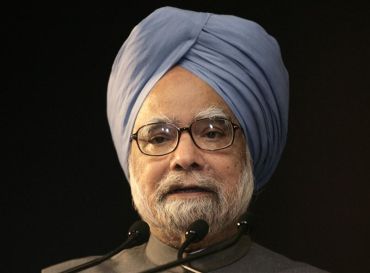
On Wednesday, Prime Minster Manmohan Singh came under Opposition attack for the umpteenth time over corruption charges.
Leader of the Opposition in the Lok Sabha Sushma Swaraj led a scathing attack on Dr Singh over the 'cash for votes' scam and the consequent WikiLeaks charges, wondering how he could wash his hands of the matter as he had headed the government in 2008 and was the 'biggest beneficiary' of the trust vote.
"As head of the government he should take responsibility instead of making others a scapegoat for the omissions and commissions of his regime. It is the habit of the prime minister to blame others," she said.
Is it really so? Is 'passing the buck' a regular ploy with the PM?
Rediff.com takes a look at where the PM has blamed others for omissions and commissions.
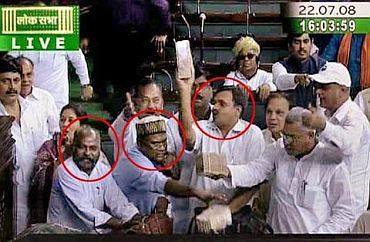
Strongly rejecting allegations of bribery apparently 'revealed' by WikiLeaks citing correspondences between the US embassy and the state department in Washington DC during the July 2008 trust vote, Prime Minister Manmohan Singh on March 18 said nobody from the Congress or the government engaged in any 'unlawful act' and the charges were 'unverified and speculative.'
Making a statement in both the Houses of Parliament, an assertive Singh hit back at the Opposition for raising 'old charges that have been debated, discussed and rejected by the people of India,' referring to the charges in the WikiLeaks that bribes were paid to win the confidence motion in July 2008.
He pointed out that the UPA-I had won the confidence motion in July 2008 with 275 votes in favour and 256 against. These allegations of bribery were investigated by a committee of the 14th Lok Sabha which concluded that there was insufficient evidence to draw any conclusion.
"I am disappointed that the Opposition has forgotten what happened thereafter. The Opposition repeated the allegations of bribery and how did the people respond," he said, citing the increase in Congress seats from 141 to 206 as compared to Bharatiya Janata Party whose tally declined from 138 to 116 and that of the Left parties from 59 to 34.
To this statement, Sushma Swaraj responded a couple of days later, that the people of the country were fed up with 'I don't know anything, I am not aware of anything, there are coalition compulsions and I am not that much guilty as I am made out to be' type excuses of the PM.
"The issue involves your leadership," she said, quoting an Urdu couplet which means one should not make any excuse but tell how the caravan got looted.
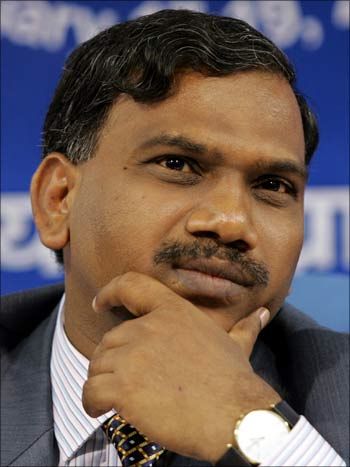
Prime Minister Manmohan Singh on February 16 broke his silence on the scams that have tarnished the image of the United Progressive Alliance government.
Addressing editors of prominent television news channels in New Delhi, the prime minister said, "I have never said that I have never committed any mistake, but I am not such a big culprit as is being projected. I wish to assure the country as a whole that our government is dead serious to bring to book all the wrongdoers regardless of their position in 2G spectrum, CWG, ISRO and Adarsh scams."
Dr Singh also stated that he was not aware of the methodology of the controversial first-come, first-serve policy followed for the award of 2G licences and spectrum by disgraced former telecom minister A Raja.
Referring to Dravida Munnetra Kazgaham leaders, the prime minister said that in a coalition government, the choices of the leaders of the alliance partners have to be accepted.
When asked why Raja was re-appointed the telecom minister in UPA II even after allegations of irregularities in the allocation of 2G licences, the prime minister replied, "Complaints were coming but I was not in a position to make up my mind if anything was seriously wrong."
Repeatedly stressing on coalition compulsions, the prime minister virtually admitted that many decisions were taken by individual ministers and officials without the full participation of the Cabinet.
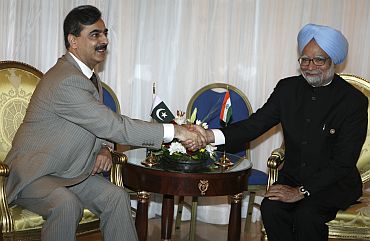
In July 2009, the PM faced stringent attacks from the Opposition for 'softening India's stance' to delink terror from dialogue in the Indo-Pak joint statement signed at Sharm-el-Sheikh with his Pakistani counterpart Yousuf Raza Gilani.
The PM said the so called 'change in stance' was a result of Pakistan's formal admission (that their nationals were involved in the 26/11 Mumbai attacks) and initial action taken against the perpetrators, something that the preceding National Democratic Alliance regime could never achieve.
"This has been the history of our relations with Pakistan over the last decade. Shri Atal Bihari Vajpayee took a decision of political courage to visit Lahore in 1999. Then came Kargil and the hijacking of an Indian Airlines plane to Kandahar. Yet, he invited General Musharraf to Agra and again tried to make peace. The nation witnessed the terrible attack on Parliament in 2001. There followed an extremely difficult phase in our relationship," the PM told Parliament.
"But, to his great credit, Vajpayee was not deterred, as a statesman should not be. I, for one, share Vajpayee's vision, and I have also felt his frustration in dealing with Pakistan," he added.
The Bharatiya Janata Party launched a frontal assault on him for compromising on India's stated position on Pakistan in the Sharm-el Sheikh joint statement and said the "waters of the seven seas will not be able to wash the shame" brought on the country through this flawed initiative.
"The distinction between the aggressor and the victim has been completely obliterated," BJP leader Yashwant Sinha, also a former external affairs minister, had said while alluding to a line in the joint statement that said both countries recognise terrorism as the "chief threat".
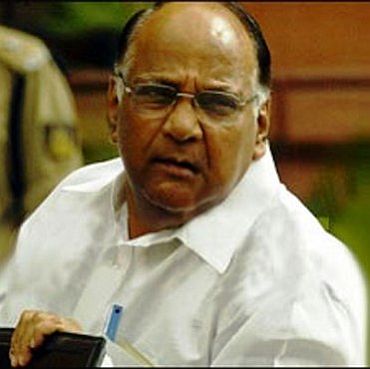
When the price-rise issue choked the UPA government, the Congress and the prime minister sought to blame Union Agriculture Minister and alliance partner Nationalist Congress Party chief Sharad Pawar, and asked him 'to act seriously' to bring down the soaring prices of the essential commodities.
Pawar retorted sharply, saying that it's unfair for the Congress to blame the agriculture ministry alone, as all price-rise related decisions are taken at the Cabinet level, which includes the prime minister and the finance minister.
"It's a collective responsibility. PM, FM cannot be absolved from taking the responsibility," Pawar had said.
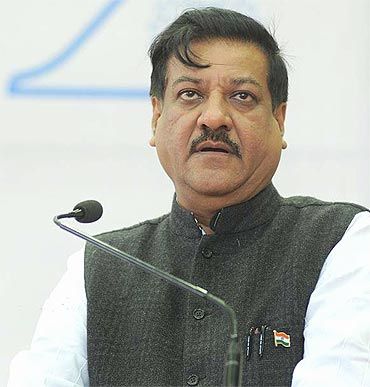
The prime minister also blamed former minister of state for personnel and training Prithviraj Chavan (now Maharashtra chief minister) for the Central Vigilance Commissioner fiasco, saying he failed to bring up the tainted past of P J Thomas before the high-powered panel that appointed him.
Maintaining that the 'responsibility' (for preparing the faulty department of personnel and training note) was that of the MoS in the Prime Minister's Office, Singh, however, said he was 'accountable' and takes full 'responsibility for the error of judgement.'
"I was aware of the pending court case only when the Leader of the Opposition in the Lok Sabha raised the issue at the meeting," Singh informed the Rajya Sabha.
"But since he was appointed as the chief secretary of Kerala and a secretary to the Union government, I thought all issues related to vigilance clearance must have been looked into by the department of personnel and training," he said.